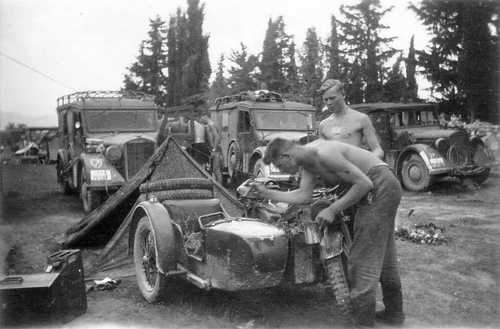
German Forces
Kradmelder
fbbrummbar
Heinz Eisner (foreground) and Rudi Blechsmidt give their Zündapp motorcycle-combination a fresh coat of paint. In the background their tent in front of two Kfz. 17 radio vans and one Kfz. 15 signals van. Eisner wrote: “In February 1941, after I had completed my motorcycle driving course in Metz, I was issued a 600cc Zündapp motorcycle combination and I became ‘Kradmelder’ (dispatch rider) between the Nachrichtenzug and Panzermeyer, with Rudi Blechschmidt in the sidecar. The other motorcycle was driven by a certain Kurt Zothe from Vienna – his co-driver was named Lorenz Hoffmann. A ‘Sonderkommando’ (special unit) was formed and sent to the train station to entrain. Glazed frost caused the field kitchen truck to crash and it was called off. Blechschmidt and I were then entrained two days later and the rail transport carried us through Hungary and Bulgaria to Rumania. From the Panzerspähkompanie it was two guys in a Kfz. 15 and the two of us on my motorcycle combination. Our destination was Constanța where we were detrained. The driver of the Kfz. 15 had been careless – his car was frozen and it had to stay behind in Constanța. The two men were also loaded on my bike. We drove to Tulcea (126 kilometres north of Constanța) where a supply point was established and we received petrol and provisions and were then sent to the Dobruja region, to a village called Cerna, fifty kilometres west of Tulcea. There we were to prepare quarters for the Panzerspähkompanie. It was the best time I had as a soldier. The locals were very friendly. They organised dancing parties with ‘Folklore-Musik’ (folk music) and served wine and pies. After a few days we got along perfectly. Every eight days we got new provisions from Tulcea. We also drove to the thermal baths in Brăila. In Brăila a German ship was moored which was to transport a cement factory to Turkey. The ship had been in the harbour since the outbreak of the war. Its captain was generous and we feasted on the German beer he supplied he and exchanged our money for ‘Lira’. The best was yet to come, the troops never arrived – we were summoned back and were designated to go to Câmpulung. From there we drove to Kyustendil – in western Bulgaria – then through Yugoslavia and Macedonia to the city of Larissa in Greece. Meanwhile the Balkan Campaign had been won without us.“ Source: www.facebook.com/groups/gustavknittel//history of WW2
1781 Views
9/6/2018
